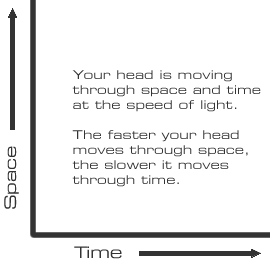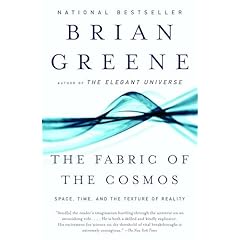Why time slows when approaching the Speed of Light. A simple explanation.
 Tue, November 14, 2006 at 9:03 PM in
Tue, November 14, 2006 at 9:03 PM in  A simple explanation
A simple explanation I find myself discussing physics often with others who don't quite share my fascination. My father, my wife, and many other have had to sit through diatribes of quantum theory, gravity waves and M-Theory. Now it's your turn. Sorry, I just can't help myself.
Why time slows for someone approaching the Speed of Light.
A simple explanation.
I'm sure you've heard that nothing can travel faster than the speed of light. (That's not quite true. The expansion of the universe allows for faster than light travel but that's another post.) You're also aware that time slows down the closer you get to the speed of light. You know, the 'One twin goes off to Alpha Centauri at the speed of light and comes back after 80,000 years but he's only aged 3 months' story.
Ever wonder why? Here's the crib notes.
Everything in the universe always travels exactly at Light Speed.
Time dilation: Special relativity declares a law for all motion: the combined speed of any object's motion through space and it's motion though time is always precisely equal to the speed of light.
 That's right, everything. You, me, the computer screen you're looking at, your grandma's French toast, Santa Clause... everything.
That's right, everything. You, me, the computer screen you're looking at, your grandma's French toast, Santa Clause... everything.
Everything is traveling through Spacetime: space (the three dimensions we experience and the nine others that m-theory predicts) and time. Adding the total movement through both space and time always equals light speed. Always. Always. Always.
Since you must travel constantly at exactly the speed of light, when you increase your speed through space, you decrease your speed through time.
Your head (and the rest of you) is traveling through spacetime at the speed of light, but all of your head's movement when you're at rest is through time, none of it is traveling through space. Every time your head moves through space; in a car, in a plane, in a spaceship... even nodding up and down, some of it's movement in time is lost since it is now moving through space. Cool huh.
What about light?
Since light waves use all of their motion to travel through space at Light Speed, they have absolutely no motion through Time. Every photon that has ever been produced exists in an ageless state. The universe ages, light does not.




Reader Comments (7)
Super String Theory? Yeah, you'll like that. :)
so simple!
Now transferring this idea to space (no friction) and a large no of piggy back vehicles, I would surmise that one could attain quite a considerable speed with this sling-shot approach.
I cannot see in theory why the speed of light could not be breached,ie with a vehicle travelling just below the speed of light which then launches the last piggy back car (or rocket), but I am sure I am missing a basic element somewhere.
Can someone explain so that my long suffering family can sleep at night?
Let me help you out with why that won't work.
Here's the simple explanation:
The reason that you need increasing power to propel a particle with mass to speeds approaching the speed of life is that the particles mass increases exponentially with it's speed. This results in a very simple law.
In order to propel a particle with ANY mass at the speed of light, the energy required is infinite. (ie: It would take more energy than exists in the entire universe to propel a single neutron to light speed.)
More on this at http://www.simplecuriosity.com
How did Einstein, Newton, etc formulate their theories about the universe when we are just today discovering information that validates those theories?